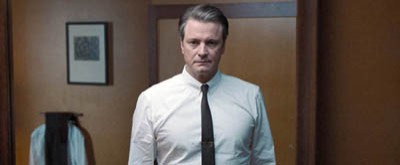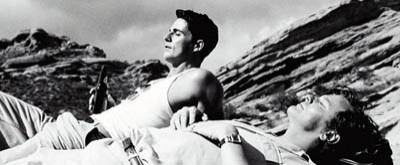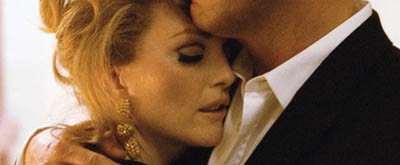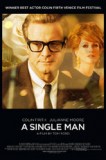| Reviews & Columns |
|
Reviews DVD TV on DVD Blu-ray 4K UHD International DVDs In Theaters Reviews by Studio Video Games Features Collector Series DVDs Easter Egg Database Interviews DVD Talk Radio Feature Articles Columns Anime Talk DVD Savant Horror DVDs The M.O.D. Squad Art House HD Talk Silent DVD
|
DVD Talk Forum |
|
|
| Resources |
|
DVD Price Search Customer Service #'s RCE Info Links |
|
Columns
|
|
|
Single Man, A

Tom Ford's debut motion picture, A Single Man, is a beautiful and delicate thing, unlike anything I've seen from this year's crop of productions. It is an artful, soulful, emotional piece of filmmaking, a character study that is deeply personal and yet also examines a whole subculture and a specific time period. It's about being gay and yet also just about being a living, breathing, loving human being.
Colin Firth stars in the movie as George, an English professor at a small Southern California college in 1962. An older gentleman, George is a homosexual with a bit of a drinking problem, as well as some undefined health issues that make each new day a surprise just as much as his personal grief makes it a chore. George lost his long-term life partner Jim (Matthew Goode, Watchmen) in a car accident sometime in the past. Recent enough to sting, but maybe long enough for others to think he should get over it. George doesn't want to get over it, and on this particular Friday at the end of November, he's planning to make that a final decision. George is planning to commit suicide.
A Single Man is based on a novel by Christopher Isherwood, the co-writer on the movie The Loved One and the author whose stories inspired Cabaret. His tale here is one of those stories that places its character in a pocket of time where all horizon lines point to a single moment. The air around George seems to bend as he moves, creating a bubble that others can see and some even venture to pierce. He meets a Spanish hustler (model Jon Kortajarena) outside a liquor store, and the young man picks up on the older man's despair, even as George ignores the possible irony of the scene being framed by a giant advertisement for Psycho. Likewise, a pretty young student named Kenny (Nicholas Hoult from the BBC's Skins) suddenly takes an extra interest in his teacher, even though George can't figure out why. (And some obfuscation from Ford makes even the audience wonder if Kenny isn't up to something.) Little kids and dogs look at George funny, too. Everything reminds him of Jim, and thus everything reminds him that he wants to die.

The name Tom Ford may sound familiar. That's because he is a famous fashion designer. For his first foray into film, he isn't content to just direct, but he's also one of the producers on A Single Man and he co-wrote it with David Scearce, another first-timer. For a couple of movie virgins, they sure seem to know what they are doing. A Single Man is a breathtaking, ambitious artistic achievement. I suppose one shouldn't be surprised that Ford, who comes from an industry where an attention to minute details is required, would be so observant of the finer things. His recreation of the early 1960s is exacting down to the most minor facet, from the music to the clothes to the tin box George's aspirin comes in. He uses color and lighting for an emotional effect, bringing the lighting up and down based on George's mood. A little girl (Ryan Simpkins) or the sudden appearance of Kenny literally brightens his day, like Ford has put a dimmer on the character's life. I said that this is unlike anything I've seen made this year, but A Single Man does remind me of another movie I've seen in 2009. A friend gave me Terence Davies' 1992 autobiography The Long Day Closes for my birthday, and the way Ford uses art direction and camera movement reminds me of that marvelous piece of cinema, only on the opposite side of a man's life. Some of the plot also brings to mind the Pet Shop Boys song "To Speak is a Sin," as if this move were an extended music video for that Very album cut.
Which is not meant to minimize Ford's achievement. He and cinematographer Eduard Grau and editor Joan Sobel (The Quiet) have made a movie that looks beautiful and flows in and out of dream-like states, always coming back down to earth with a heart-wrenching thud. In this, they are also ably assisted by some wonderful music. The compositions by Abel Korzeniowski (Kieslowski's Big Animal) and Shigeru Umebayashi (2046) enhance the emotions of the film, straining against their own beauty to keep from standing out too much. Ford pays the same attention to detail in the timbre of each melodramatic moment as he does to each pants cuff or shirt collar. I think it's safe to assume that he oversaw every facet of this production, start to finish, down to each little sound. It's too fully realized, nothing is accidental.
Of course, it would just be a lot of pretty pictures without actors to make it come alive. Colin Firth is staggering as the hopeless professor, his breath stopping short each time a little hope stumbles his way. He makes George melancholy without being mawkish, and when the fires of a particular passion do overtake him, he doesn't go so far from the center he's created as to make it seem like a whole other person. There is actually something a little predatory about George that goes hand in hand with the inherent selfishness of a suicide, and Firth isn't afraid to bare those fangs.

Also of real note is Julianne Moore, who has a small but significant role as Charley, George's best friend. Charley is a boozer with several divorces under her belt, living a secluded life of alimony and gin. She and George have had their dalliances, and they could have formed their own stock company of Who's Afraid of Virginia Woolf? had not Jim come along (we see much of Jim in flashback, just so we can know what's got George so upset). A besotted dinner and impromptu dance party at Charley's is heartwarming and yet sad. These two have found a camaraderie in one another, but it will never be enough.
There is a tiny stagger at the very end of the film. It's a conclusion that likely works better on the literary page, when it can be framed in language that will keep it from seeming so convenient. That said, I can't see any other way for Tom Ford to have his movie finish. It allows him to bookend A Single Man with corresponding dreams, shuttling George to where he needs to go in a way that is true to his character and also satisfying in the sentiments it conjures. When it was all done, I could only just sit and stare in awe at the credits. A Single Man left me gobsmacked.
Jamie S. Rich is a novelist and comic book writer. He is best known for his collaborations with Joelle Jones, including the hardboiled crime comic book You Have Killed Me, the challenging romance 12 Reasons Why I Love Her, and the 2007 prose novel Have You Seen the Horizon Lately?, for which Jones did the cover. All three were published by Oni Press. His most recent projects include the futuristic romance A Boy and a Girl with Natalie Nourigat; Archer Coe and the Thousand Natural Shocks, a loopy crime tale drawn by Dan Christensen; and the horror miniseries Madame Frankenstein, a collaboration with Megan Levens. Follow Rich's blog at Confessions123.com.
|
| Popular Reviews |
| Sponsored Links |
|
|
| Sponsored Links |
|
|
| Release List | Reviews | Shop | Newsletter | Forum | DVD Giveaways | Blu-Ray | Advertise |
|
Copyright 2024 DVDTalk.com All Rights Reserved. Legal Info, Privacy Policy, Terms of Use,
Manage Preferences,
Your Privacy Choices | |||||||










